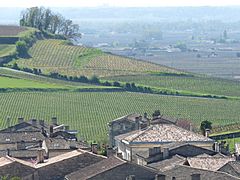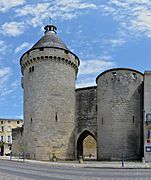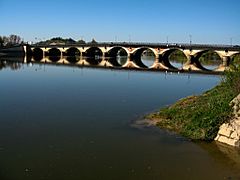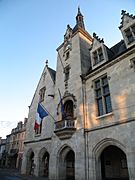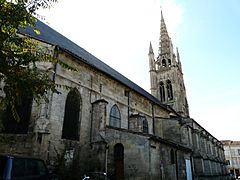Libourne facts for kids
Quick facts for kids
Libourne
|
||
|---|---|---|
|
Subprefecture and commune
|
||
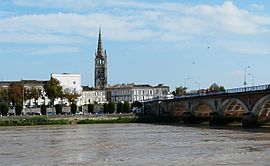
View of Libourne and the Dordogne river
|
||
|
||
| Country | France | |
| Region | Nouvelle-Aquitaine | |
| Department | Gironde | |
| Arrondissement | Libourne | |
| Canton | Le Libournais-Fronsadais | |
| Intercommunality | Communauté d'agglomération du Libournais | |
| Area
1
|
20.63 km2 (7.97 sq mi) | |
| Population
(2014)
|
24,595 | |
| • Density | 1,192.20/km2 (3,087.8/sq mi) | |
| Demonym(s) | Libournais | |
| Time zone | UTC+01:00 (CET) | |
| • Summer (DST) | UTC+02:00 (CEST) | |
| INSEE/Postal code |
33243 /33500
|
|
| Elevation | 2–28 m (6.6–91.9 ft) (avg. 15 m or 49 ft) |
|
| Website | www.ville-libourne.fr | |
| 1 French Land Register data, which excludes lakes, ponds, glaciers > 1 km2 (0.386 sq mi or 247 acres) and river estuaries. | ||
Libourne (called Liborna in Gascon) is a town in southwestern France. It is located in the Gironde department, which is part of the Nouvelle-Aquitaine region. Libourne is an important administrative center, known as a sub-prefecture.
This town is famous for its wine production. It's very close to Saint-Émilion and Pomerol, which are both well-known for their excellent wines.
Contents
History of Libourne
Libourne was first established in 1270 by a person named Roger de Leybourne. It was built as a bastide, which is a type of planned town from the Middle Ages. These towns usually had a grid pattern for their streets.
The town's original name was Leybourne, but it later changed to Libourne. Its main purpose was to be a port. From here, wine from the Dordogne valley could be shipped easily to England.
Geography of Libourne
Libourne is located where two rivers meet: the Isle and the Dordogne rivers. This meeting point is called a confluence. The town is about 31 km (19 mi) from Bordeaux and 98 km (61 mi) from Arcachon.
The town covers an area of about 20.6 km2 (8.0 sq mi). Its average height above sea level is 15 m (49 ft). At the city hall, the height is 10 m (33 ft).
Libourne is surrounded by several other towns. These include Les Billaux, Lalande-de-Pomerol, Pomerol, Saint-Émilion, Moulon, Génissac, Arveyres, Fronsac, and Saillans.
 |
Saillans | Les Billaux | Lalande-de-Pomerol Pomerol |
 |
| Fronsac | Saint-Émilion | |||
| Arveyres | Génissac | Moulon |
Climate in Libourne
Libourne has a Marine West Coast Climate. This type of climate is also known as Cfb in the Köppen climate classification system. It means the town has mild winters and warm summers.
Population of Libourne
The people who live in Libourne are called Libournais in French. If you're talking about women from Libourne, they are called Libournaises.
Libourne has a population of 24,595 people. This means that about 1,192 people live in each square kilometer of the town's area.
Evolution of the population in Libourne

Administration of Libourne
Since 1790, Libourne has been a sub-prefecture of the Gironde department. This means it's an important center for local government. It is also the main town of the arrondissement of Libourne.
Libourne is also the administrative centre (called chef-lieu in French) of the canton of Le Libournais-Fronsadais. A canton is a smaller administrative area. This canton had 53,307 inhabitants in 2014.
The town is part of a group of communes called Le Libournais. This group works together on shared services and projects.
Twin Towns
Libourne has special partnerships with other towns around the world. These are called twin towns:
 Morocco
Morocco Berne, Switzerland
Berne, Switzerland Morocco casablanca, Morocco
Morocco casablanca, Morocco
Gallery
Images for kids
Related pages
See also
 In Spanish: Libourne para niños
In Spanish: Libourne para niños
 | John T. Biggers |
 | Thomas Blackshear |
 | Mark Bradford |
 | Beverly Buchanan |





